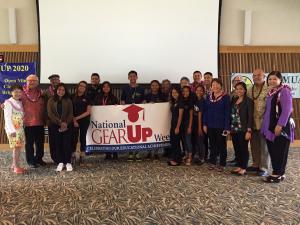Hawaiʻi celebrates success of college access program that serves more than 20,000 students
University of HawaiʻiHonolulu, Hawai‘i – Students from Kaimuki, Nānākuli, Wai‘anae and Waipahu High Schools spoke today to the Hawai‘i State Legislature about the college access program GEAR UP and the impact it has had on their success in high school and aspirations for college.
GEAR UP (Gaining Early Awareness and Readiness for Undergraduate Programs) is a college access program funded by the U.S. Department of Education. Since its inception in 1999, GEAR UP has improved educational outcomes for millions of low-income students across the United States. This week, Hawai‘i celebrates the success of its GEAR UP programs as part of National GEAR UP Week.
There are three GEAR UP programs in Hawai‘i: GEAR UP Hawai‘i, GEAR UP Waipahu and Holomua GEAR UP. Each program collaborates with the Hawai‘i State Department of Education (HIDOE), the University of Hawai‘i (UH) System as well as the government, nonprofit and private sectors to provide information, encouragement, support, resources and services to over 20,000 students statewide to help eliminate achievement gaps among groups traditionally underrepresented in higher education.
GEAR UP Hawai‘i, the statewide grant under Hawai‘i P-20 Partnerships for Education, works with students in grades 7 through first year in college. One of its major initiatives is to increase financial aid awareness and FAFSA (Free Application for Federal Student Aid) completions for low-income students and families. Research shows that FAFSA completion is strongly associated with postsecondary enrollment. The National College Access Network reports 90 percent of high school seniors who complete the FAFSA attend college directly from high school, compared to just 55 percent of FAFSA non-completers. By leveraging local financial aid expertise and resources, GEAR UP Hawai‘i provides students and families with financial aid, FAFSA and scholarship information through school and community-based activities, tailored to the specific needs of each community. Outreach efforts have proven successful as data from Federal Student Aid show that FAFSA completion rates for HIDOE students at low-income schools increased by 3 percentage points this year, from 47% to 50%. “GEAR UP inspires hopes and dreams that college is possible and attainable” says Angela Jackson, GEAR UP Hawai‘i Project Director and Associate Director of Hawaiʻi P-20 Partnerships for Education. “Providing students the support they need to find money for college reinforces the message that it is affordable, and helps eliminate one of the major barriers that prevent students from pursuing postsecondary education.” This fall, GEAR UP Hawai‘i is launching a “Cash for College” FAFSA Challenge for select high schools to encourage more seniors to complete the FAFSA as well as developing an online financial aid tool kit for high school counselors statewide with resources to support their outreach efforts.
GEAR UP Waipahu is a partnership between UH Mānoa and Waipahu High School and is currently serving its 9th grade students. “GEAR UP differs from other college access programs in that we are able to guide and mentor students from middle school, into high school, and during their first year in college,” says Erwin Legaspi, Project Director for the GEAR UP Waipahu Grant. “Waipahu is at the forefront of much change and development in Hawai`i, and the overall goal of our program is to ensure that students are ready to become active participants in the new economy and meet any challenges that arise.” Currently, GEAR UP Waipahu is planning opportunities for their students to explore college, including a visit to the Armstrong NASA facility in Mojave, CA.
The Holomua GEAR UP grant provides support to the seniors at Wai‘anae and Nānākuli High Schools through their partnership with UH West Oahu. “Our focus this year is not only to ensure that our seniors are on track to graduate from high school, but to also provide them with the necessary tools to transition successfully to college,” says Jean Javellana, Project Director for Holomua GEAR UP. “Through this effort, we collaborate with community partners to prepare our students to navigate through the college admissions process, as well as become self-sustainable and economically independent citizens."
Holomua GEAR UP also supports the growth of the Early College High School (ECHS) Programs at both schools. Participating students simultaneously earn both college and high school credits, while cultivating skills necessary to succeed in college and career. Data from Hawai‘i P-20 Partnerships for Education shows that the ECHS Program has had a positive impact on the indigent communities of the Leeward Coast including increased college enrollment rates. “Holomua GEAR UP is proud to have contributed to the growth of a college going culture in schools with a high concentration of poverty, and low rates of post-secondary educational attainment," says Javellana.
The GEAR UP programs have been critical in leading education reform efforts to help reach the state’s goal of 55 percent of working age adults holding a two- or four- year college degree by 2025. “National GEAR UP Week is a time to highlight the achievements of these programs as well as programs across the country,” says Karen Lee, Executive Director of Hawai‘i P-20 Partnerships for Education. “To be part of a national effort committed to expanding college access opportunities to build up our future workforce is something worth celebrating.”
For more information about GEAR UP, please contact Lesli Yogi, Business and Community Outreach Specialist, lyogi@hawaii.edu or go to http://gearup.hawaii.edu. To learn more about the national GEAR UP program, please contact the National Council for Community and Education Partnerships at
202-530-1135 or www.edpartnerships.org.
###

